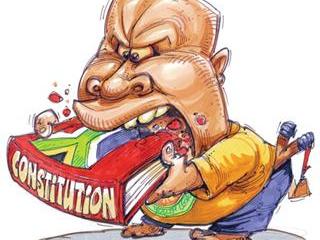
Prof Pierre de Vos, the Claude Leon Foundation chair in Constitutional Governance at the University of Cape Town, argues for a marriage of these two needs and the transfer of land to those who can use it profitably.
Malema vowed once again to ‘take land without payment’ at the closing ceremony of the ANC Youth League (ANCYL’s) elective conference, sending a chill down the spine of many a property owner. ‘There’s no way you can be diplomatic about the issue of land. We’ll never be diplomatic about willing buyer/willing seller. It has failed,’ Malema told delegates.
Earlier, he said that the ANC must achieve a 75% majority at the next election so it can change the Constitution to allow for the taking of land without compensation. Malema is, of course, correct that the ‘willing buyer/willing seller’ land redistribution policy hasn’t been a great success. The speed of land reform has been slow, to say the least. He’s also correct in saying blacks were dispossessed of their land during the colonial and apartheid era. But this doesn’t mean all white people, who now own property, stole that property from black South Africans.
While many of us might have had a head start in the property market due to our relative privileged position as whites who benefited from apartheid (which gave us better opportunities than we would’ve had if we were black), most of us actually took a bank loan to pay for our property. Granted, most of us would never be able to afford a R250 000 Breitling watch (unlike Malema, who wears one despite his R35 000/month ANCYL salary), but we’d probably be financially far better off if we didn’t have to pay a bond instalment every month.
However, changing the Constitution really shouldn’t be a high priority for Malema and his organisation. He might not know, but the Constitution contains a property clause that deals with the protection of existing property rights and the expropriation of property, as well as land redistribution. While section 25(1) states clearly that no one may arbitrarily be deprived of property, section 25 (2) states that property may only be expropriated subject to the payment of equitable compensation.
It’s important to note that the state isn’t always required to pay market value for the property when it expropriates that property. The time and manner of payment must reflect ‘an equitable balance between the public interest and the interests of those affected, having regard to all relevant circumstances, including the current use of the property; the history of the acquisition and use of the property; the market value of the property; the extent of direct state investment and subsidy in the acquisition and beneficial capital improvement of the property; and the purpose of the expropriation.’
So, a value that’s lower than the market value may be paid for a property that the owner obtained as a direct result of apartheid’s forced removals, say, or because the owner happened to have had good connections with the then-ruling National Party. Further subsections of the property clause aim at redressing the grossly unequal distribution of land in South Africa. In fact, section 25 (5) explicitly states that the state ‘must take reasonable legislative and other measures’ to ‘foster conditions that enable citizens to gain access to land on an equitable basis’.
Source: http://constitutionallyspeaking.co.za.
Read more in the 8 July 2011 issue.













